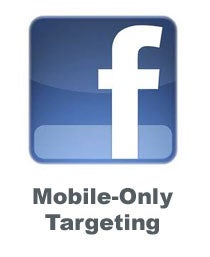 Are advertisers frustrated with the limits of Facebook ads witnessing the advent of a more conciliatory approach? A new change allowing marketers to serve ads only to the news feed – or even only to the mobile news feed – suggests that may be the case. But agencies want more.
Are advertisers frustrated with the limits of Facebook ads witnessing the advent of a more conciliatory approach? A new change allowing marketers to serve ads only to the news feed – or even only to the mobile news feed – suggests that may be the case. But agencies want more.
Before yesterday’s change, marketers could already buy sponsored stories on mobile, as part of a bundle that also included desktop news feed and right-nav placements. This week’s news – importantly for mobile app developers at least- allows them to buy sponsored stories on mobile separately from desktop.
Facebook says advertisers have requested more control: “As companies are promoting services more frequently on mobile, this option gives them the opportunity to focus on specific placements that will impact them most directly.”
We asked agency folks to weigh in. Their attitude: While more choice is always welcome, Facebook must dive deeper into its contextual data and offer better segmentation for its ad products to approach their potential.
Scroll down or click below to read more:
- Bradley Rogers, Commercial Director, Neo@Ogilvy
- Eduard Katz, president, MediaWhiz
- Hollis Thomases, CEO, Web Advantage.net
- Nathaniel Perez, global head of social experience, Sapient
Bradley Rogers, Commercial Director, Neo@Ogilvy
We think this a step in the right direction by Facebook to provide marketers with greater control over where and how we reach our audience. Consumer usage of mobile devices far outpaces advertising opportunities to reach them effectively, and this is one of the few platforms with the scale to redress that balance.
The more options we have to select placements and differentiate across channels and devices, the greater the ability to deliver performance for our clients.
We know that Facebook interaction takes place almost exclusively in association with the newsfeed, particularly on mobile devices. The fact that we can now reach that audience in the area where activity takes place, rather than an avoidable ad unit shows a recognition from Facebook that they need to raise the bar.
We’re pleased to see that Facebook continues to focus on innovating and providing marketing opportunities aligned with how consumers interact with their platform. If they can continue on a trajectory that provides advertisers with the ability to further segment audiences, control delivery, and track the impact of their programs, we expect to see advertisers accelerate their investment with Facebook.
Eduard Kats, president, MediaWhiz
As far as breaking out and segmenting, that makes complete sense for Facebook in particular. It’s clear they have a specific need for growth, and today I don’t think they’re monetizing their mobile – whether mobile access or mobile traffic – effectively.
As far as what it means for agencies, it’s just another opportunity for us to segment and target deeper. Facebook has given us some ability, and it’s going to continue to evolve in terms of how we access the inventory. Segmentation is going to be key. They’ve got some great opportunities for us to segment.
They want to be able to show value in return for the advertising dollars agencies are spending. The more we can drill down into…data that’s already available through their interface, that’s going to increase conversion rates.
They have to do this because if you look at the display landscape, their conversion rates aren’t what you would want to see. It might make sense that that’s the case. Consumers are there to interact and have social conversations and not necessarily interact with ads that are displayed. The ability to target better and go deeper will have benefits for both the agencies and the revenue Facebook is hoping to achieve.
Hollis Thomases, CEO, Web Advantage.net
Personally, I’m nonplussed about Facebook’s latest news; I’m more swayed by the new Reuters poll about users ignoring FB ads altogether. If Facebook thinks that becoming even more intrusive (by being right in a user’s newsfeed) is going to help improve response rates (let’s not discuss conversion rates), then I think they’re deluding themselves.
What does this mean for advertisers? More choice always makes for more opportunities for some (e.g. agencies who sell the latest bright shiny object) and even more confusion for others (e.g. for advertisers who should be asking themselves, “What and where should we even consider advertising on Facebook and other social media sites, and how would we rationalize this to our business objectives?”)
Nathaniel Perez, global head of social experience, SapientNitro
Facebook has enabled self-service, mobile only sponsored stories. Will that satisfy investors that are worried that increased mobile access and decreased mobile ad effectiveness are threatening the giant’s ability to grow revenue? Those who buy into this vision of simply adding insertion points into the Facebook user experience haven’t even begun to understand the challenges that lie ahead. As long as Facebook does not take the notion of context by the horns, expanding its ad delivery will only keep decreasing effectiveness down the road. Facebook has been surprisingly myopic, obsessively focused on the stream (now the timeline), failing to realize that it sits on enough contextual data to predict when we’re about to take our next breath. Until it seriously invests in advanced social and behavioral intelligence methods, it will simply keep being challenged by decreasing effectiveness in a world where digital ubiquity has wired our brains to ignore ads that don’t have any meaning in the moment.
By Zach Rodgers












